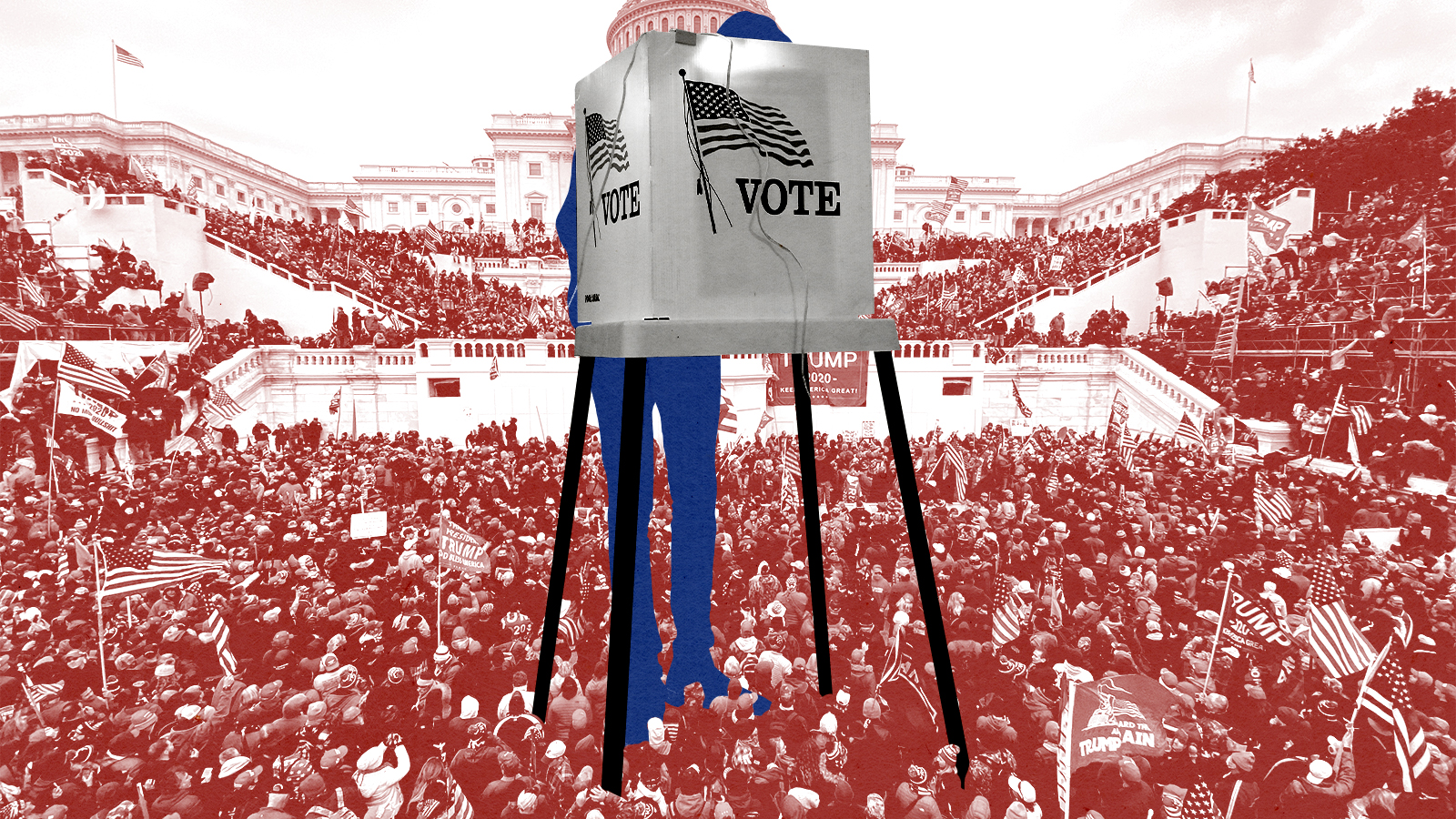Is democracy on the midterm ballot?
Politicians and voters seem to have different ideas about what's under threat


A free daily email with the biggest news stories of the day – and the best features from TheWeek.com
You are now subscribed
Your newsletter sign-up was successful
President Biden recently warned American voters that democracy is on the midterm ballot. "In our bones, we know democracy is at risk," Biden said in the speech. He cited acts of political violence and election deniers as imminent threats. Others have echoed his concerns on the campaign trail, though polls suggest voters might not be all that concerned.
What are the issues that Biden claims threaten the future of democracy, and how will they impact the midterm elections? Here's what you need to know:
What are politicians saying about the threat to democracy?
During his speech at Washington D.C.'s Union Station on Nov. 2, Biden implored American voters to stand united against the threat that election deniers pose, describing the U.S. as a nation with its transitions of power under threat. "It's estimated that there are more than 300 election deniers on the ballot all across America this year," Biden said. "We can't ignore the impact this is having on our country. It's damaging, it's corrosive, and it's destructive."
The Week
Escape your echo chamber. Get the facts behind the news, plus analysis from multiple perspectives.

Sign up for The Week's Free Newsletters
From our morning news briefing to a weekly Good News Newsletter, get the best of The Week delivered directly to your inbox.
From our morning news briefing to a weekly Good News Newsletter, get the best of The Week delivered directly to your inbox.
Biden didn't name Donald Trump directly, instead calling him "the defeated former president" while blaming him for perpetuating "dangerous" theories. He called the group of Trump supporters who stormed the Capitol on Jan. 6 "an enraged mob that had been whipped up into a frenzy by a president repeating over and over again the Big Lie that the election of 2020 had been stolen."
Other Democratic leaders have echoed Biden's sentiments while making their closing pitches to voters ahead of Election Day. Former President Barack Obama, for example, warned Arizona voters at a rally in Phoenix that if they voted for election deniers, "then democracy as we know it may not survive." His comment appeared to be a reference to Republican Arizona gubernatorial candidate Kari Lake, who has refused to commit to accepting the ballot results if she doesn't win.
What do Republicans think about the claims?
Republicans aren't buying it, instead flipping the focus onto Biden's responsibility for the state of the economy. In response to Biden's speech, Senate Minority Leader Mitch McConnel said, "President Biden is trying to divide and deflect at a time when America needs to unite — because he can't talk about his policies that have driven up the cost of living."
In a statement, Republican National Committee Chairwoman Ronna McDaniel called the president's speech "desperate and dishonest." She added that "Joe Biden promised unity but has instead demonized and smeared Americans while making life more expensive for all."
A free daily email with the biggest news stories of the day – and the best features from TheWeek.com
Is misinformation on social media fueling the fire?
Some experts are focused on social media as the epicenter of the proliferation of election-related misinformation and conspiracy theories. Tufts University dean Bhaskar Chakravorti, who studies technological change and society, says the spread of misinformation will play an essential role in the upcoming midterms and the 2024 election. He warns, "The single galvanizing narrative is that the 2020 election was stolen."
Misleading claims about mail ballot security, rumors about non-citizens voting, and stories about ballot locations being moved are spreading on various social media platforms ahead of Nov. 8. In response, some of the companies have implemented new measures to remove false information from their platforms; Meta, the parent company of Facebook and Instagram, said in a statement that "we've been applying [the] lessons" of hundreds of prior elections "to strengthen our preparations."
Critics, though, say that the sheer number of false claims in circulation indicates tech companies are falling short. Jon Lloyd, the senior adviser at the nonprofit Global Witness, says popular social media companies "are still simply not doing enough to stop threats to democracy." His organization recently published a report highlighting TikTok's failure to remove advertisements with misleading election information.
A report from the Center for American Progress warns that after the spread of voter fraud conspiracies in 2020, "considerable threats to the democratic process remain, including the refusal to certify election results, increased voter intimidation, and abuse of electoral laws." While they clarify that social media companies are not the cause, "they have allowed their platforms to be easily abused to carry out those attacks."
What do voters think?
Recent polls suggest that while voters agree that threats to democracy exist, it's not the most pressing issue this election season. A recent New York Times/Sienna College poll found that 71 percent of all voters surveyed said democracy was at risk, but only 7 percent deemed it the country's most critical problem. The top two voter concerns were the economy, at 26 percent, and inflation, at 19 percent.
Voters also seemed split over what they considered legitimate threats to the future of democracy. Republicans overwhelmingly identified Biden, mainstream media, the federal government, and mail-in-ballots as threats. Democrats mainly cited Trump, while others pointed to the Supreme Court and the Electoral College, per the Times. However, 11 percent of voters said that government corruption, in general, was the issue — more than those who named either Trump or Biden. A further 50 percent believe the American political system is "too divided politically to solve its problems."
Nate Cohn, a political analyst for the Times, supposes that some voters might have a different view of threats to democracy than politicians. "For some of these voters, the threat to democracy doesn't seem to be about the risk of a total collapse of democratic institutions or a failed transition of power," he said. "Or they may not view the threat as an emergency or a crisis yet, like being on the brink of sustained political violence or authoritarianism."
The New York Times/Siena College poll surveyed 792 registered voters nationwide via telephone from Oct. 9 to Oct. 12. The margin of error was +/- 4 percent.
Update Nov. 23, 2022: This story has been corrected to amend the spelling of Tufts University.
Theara Coleman has worked as a staff writer at The Week since September 2022. She frequently writes about technology, education, literature and general news. She was previously a contributing writer and assistant editor at Honeysuckle Magazine, where she covered racial politics and cannabis industry news.
-
 Jeff Bezos: cutting the legs off The Washington Post
Jeff Bezos: cutting the legs off The Washington PostIn the Spotlight A stalwart of American journalism is a shadow of itself after swingeing cuts by its billionaire owner
-
 5 blacked out cartoons about the Epstein file redactions
5 blacked out cartoons about the Epstein file redactionsCartoons Artists take on hidden identities, a censored presidential seal, and more
-
 How Democrats are turning DOJ lemons into partisan lemonade
How Democrats are turning DOJ lemons into partisan lemonadeTODAY’S BIG QUESTION As the Trump administration continues to try — and fail — at indicting its political enemies, Democratic lawmakers have begun seizing the moment for themselves
-
 The UK expands its Hong Kong visa scheme
The UK expands its Hong Kong visa schemeThe Explainer Around 26,000 additional arrivals expected in the UK as government widens eligibility in response to crackdown on rights in former colony
-
 ‘Hong Kong is stable because it has been muzzled’
‘Hong Kong is stable because it has been muzzled’Instant Opinion Opinion, comment and editorials of the day
-
 Japan’s Takaichi cements power with snap election win
Japan’s Takaichi cements power with snap election winSpeed Read President Donald Trump congratulated the conservative prime minister
-
 How realistic is the Democratic plan to retake the Senate this year?
How realistic is the Democratic plan to retake the Senate this year?TODAY’S BIG QUESTION Schumer is growing bullish on his party’s odds in November — is it typical partisan optimism, or something more?
-
 The billionaires’ wealth tax: a catastrophe for California?
The billionaires’ wealth tax: a catastrophe for California?Talking Point Peter Thiel and Larry Page preparing to change state residency
-
 Bari Weiss’ ‘60 Minutes’ scandal is about more than one report
Bari Weiss’ ‘60 Minutes’ scandal is about more than one reportIN THE SPOTLIGHT By blocking an approved segment on a controversial prison holding US deportees in El Salvador, the editor-in-chief of CBS News has become the main story
-
 Revisionism and division: Franco’s legacy five decades on
Revisionism and division: Franco’s legacy five decades onIn The Spotlight Events to mark 50 years since Franco’s death designed to break young people’s growing fascination with the Spanish dictator
-
 Has Zohran Mamdani shown the Democrats how to win again?
Has Zohran Mamdani shown the Democrats how to win again?Today’s Big Question New York City mayoral election touted as victory for left-wing populists but moderate centrist wins elsewhere present more complex path for Democratic Party
